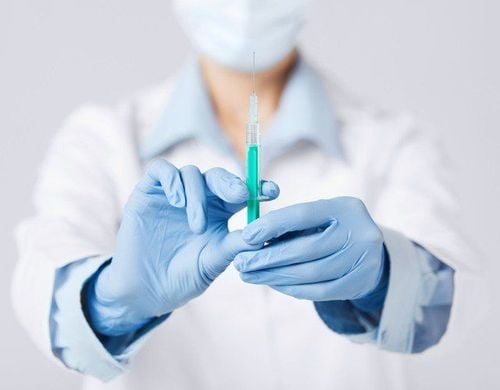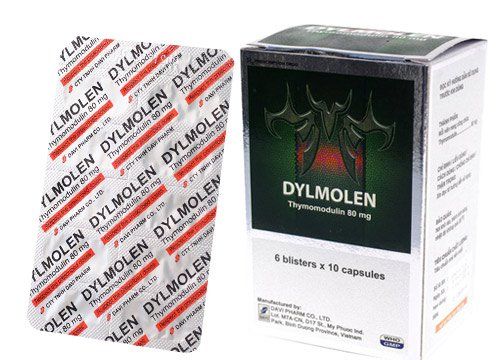This is an automatically translated article.
Anaphylaxis is a serious and potentially life-threatening reaction to one or more allergic triggers. According to the classification of the Ministry of Health, grade 3 anaphylaxis or severe anaphylaxis usually manifests itself by the severity of symptoms as well as the outcome it brings. Currently, early detection of grade 3 anaphylaxis in order to provide timely solutions is not only the duty of medical staff but also the responsibility of themselves and the patient's family.1. Early symptoms of anaphylaxis
Signs of anaphylaxis usually appear immediately or can be within 10-15 minutes after the body systems including the skin, respiratory tract, cardiovascular or gastrointestinal tract, ... exposure to allergens. In fact, the presentation of anaphylaxis in many patients does not always progress from mild to severe.Early signs of mild degree often first appear in the skin such as erythema, itching, hives, ... or appear in many other organs such as dizziness, runny nose, feeling of stuffy nose, difficulty breathing , palpitations, nausea, abdominal pain, diarrhea.
In some undetermined cases of allergen exposure, risk of anaphylaxis may be considered in the presence of unexplained hypotension or 2 early signs of anaphylaxis listed above .
Symptoms can progress very rapidly to severe anaphylaxis within minutes or even seconds of exposure, so it is important to get the patient or the nearest medical facility immediately.
2. What is 3rd degree anaphylaxis?
The Ministry of Health divides anaphylaxis into 4 levels based on clinical manifestations, in which, grade 3 anaphylaxis is a severe shock reaction in multiple organs with the following symptoms:Circulatory: Shock, low blood pressure, pulse is usually fast, small, difficult to catch. Hissing sound in the larynx or laryngeal edema. Cyanosis, rapid breathing, wheezing or irregular breathing. Disturbance of consciousness in the form of arousal, struggle, convulsions, the most severe is coma. Circular muscle disorder manifests as defecation, urinary incontinence. Signs of severe anaphylaxis may occur simultaneously or alone within a very short time after the body is exposed to the allergen. For example, cyanosis with stridor and wheezing occurs without cognitive impairment.
3. Distinguishing degree 3 . anaphylaxis
Symptoms of grade 3 anaphylaxis should be distinguished from other shocks such as hypovolemic shock, distributive shock, cardiogenic shock, etc. Cerebrovascular accident, respiratory and endocrine diseases , skin diseases, or cases of poisoning.In addition, the above manifestations may be hidden or appear unclear in patients lying in a coma, or total paralysis,... These special cases require a smooth coordination between people. patient's home and medical staff for early recognition and treatment.
4. Common causes
4.1. Medicine
Grade 3 anaphylaxis often occurs in patients who use drugs in large doses, some cases buy drugs themselves at drugstores without the guidance of treating doctors.Intravenous injection too fast, high concentration or not diluted before injection are also the reasons for severe anaphylaxis.
Some drugs often cause anaphylaxis such as antibiotics, vaccines, anesthetics, iodinated contrast agents used in diagnostic imaging,...
4.2. Insect venom
Stings, bites containing venom of bees, ants, spiders, scorpions, ... often lead to anaphylaxis with early symptoms on the skin. Rarely, severe anaphylaxis has been reported in patients with insect stings. Emergencies from snake, spider or scorpion bites require simultaneous assessment of the risk of toxicity and anaphylaxis.4.3. Food
The frequent use of, or large quantities of, foods is also a source of anaphylaxis. Especially food related to seafood such as shrimp, shrimp, crab, tuna, mackerel, ... beans, additives.4.4. Other causes
If the cause is not clear, other reasons should be considered, such as: Excessive physical activity during exercise, or latex allergy.In a small number of cases without a specific cause, the assessment of the risk of anaphylaxis is usually based on clinical symptoms.
5. Prevention of 3 degree anaphylaxis
If you have a history of severe allergies or have had anaphylaxis in the past, it is important to try to prevent future recurrences with some of the following:Identify possible allergies can be acquired by visiting medical facilities and doing tests such as skin prick test or serum allergy test. Allergens should be avoided such as: Food: Check food labels and ingredients before eating. Let the staff at the eatery know you are allergic to certain ingredients in the meal so that the chef can remove them. Insect venom: Move carefully away from the insects, avoid panic, flailing arms and legs at them. Use insect repellent in your area, especially in the summer. Avoid touching bushes and grass with bare hands and feet. Medicines: Remember the anaphylaxis drugs used to remind and provide to medical staff. Allergen information can be compiled into a small memo pad and you should always carry it with you by wearing a bracelet or around your neck. Carry adrenaline medication and syringe with you for initial self-management before being admitted to the hospital. You can ask your treating doctor to prescribe adrenaline injections and instructions on how to use the syringe and dosage if there is a risk or history of anaphylaxis. Vinmec International General Hospital is one of the hospitals that not only ensures professional quality with a team of leading medical doctors, modern equipment and technology, but also stands out for its examination and consulting services. and comprehensive, professional medical treatment; civilized, polite, safe and sterile medical examination and treatment space.
Reference source: nhs.uk
Please dial HOTLINE for more information or register for an appointment HERE. Download MyVinmec app to make appointments faster and to manage your bookings easily.













